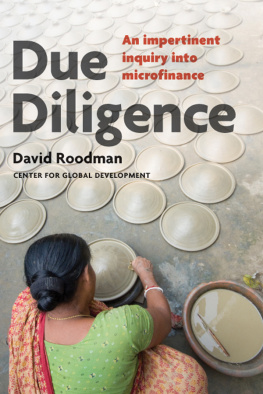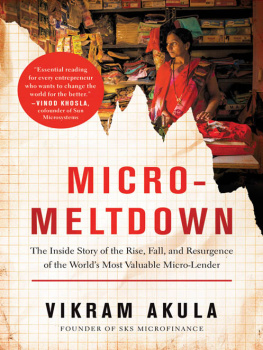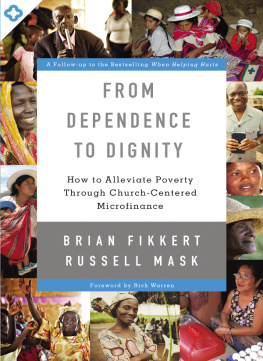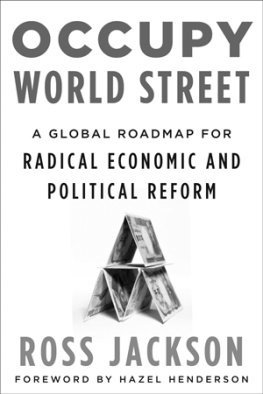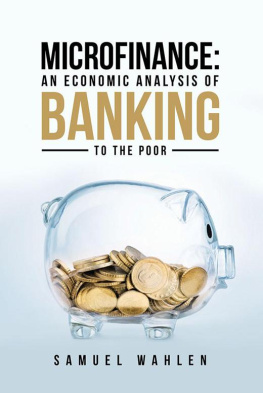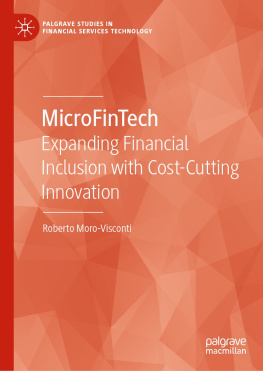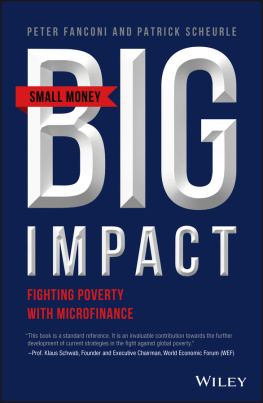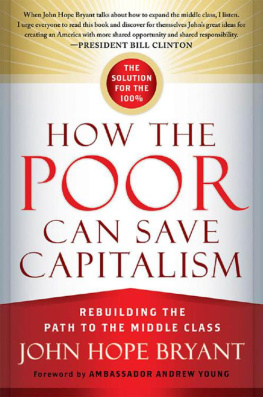Acknowledgments
T he story behind this book begins just shy of ten years ago, when I spoke with Nancy Birdsall about what topics to tackle in my new job at the Center for Global Development, which she had just cofounded. Among other things, I mentioned microenterprise and microfinance. At the mention of the latter, her eyes lit upfor two reasons, I later learned. The first was her sense, while attending the historic 1997 Microcredit Summit, that rhetoric had galloped ahead of evidence; the second was the recent Wall Street Journal expos by Michael Phillips and the late Daniel Pearl of repayment difficulties at the Grameen Bank. It was then that I decided to write a monograph on microfinance in the thoroughgoing, pedagogic mode of my last book, The Natural Wealth of Nations, written while I was at the Worldwatch Institute. But now that I had PhDs for colleaguestrained researchers with years of experience in economic developmentI doubted the value of what I might do.
And yet, after some delays and distractions, I completed the book. Along the way, I gained confidence in what I had to offer, thanks in no small part to the Microfinance Open Book Blog CGD launched to share my writing process with the public. The journey has been important to me in several ways, helping me grow intellectually and build a sense of identity in my professional life. None of this would have been possible without Nancy's faith and support, her blend of understanding patience and constructive impatience. I will always be indebted to her. I also thank everyone who commented on the blogmy guess is they number in the hundredsfor engaging me in precisely the sort of debate that I sought and for keeping me honest. I thank Scott Gaul and Daniel Rozas, who actually reviewed posted chapter drafts. All the commenters gave me something precious for an author: a sense of audience.
Inevitably in such an expansive project, I crossed paths with many people, almost invariably to my benefit. In 2006 Uzma Qureshi joined me in authoring Microfinance as Business, a CGD report commissioned by Suellen Lazarus.
Behind the scenes at CGD, publications manager John Osterman shepherded the complex book production process to completion. Lawrence MacDonald, vice president of communications and policy outreach, oversaw and advised on all aspects of the book and blog project as an exercise in communication. It was with him, under the essential tutelage of Dave Witzel, that I developed the concept of writing this book in the public eye, through the blog.
I am especially grateful to the MasterCard Foundation for supporting the completion and promotion of this book. To their contribution, as to all the others I have listed, the usual disclaimer applies: the views expressed in this volume are attributable to me alone. So I thank the foundation for what I will presume to call its wisdom in supporting this work, in the spirit of serious inquiry and constructive debate.
I am also grateful to the Consultative Group to Assist the Poor (CGAP) for its partnership with CGD and the MasterCard Foundation in promoting the ideas within this book. In particular, CGAP communications director Jeanette Thomas has done yeoman's labor fashioning this arrangement, carrying it through with hypercompetence.
As well, I thank a special proofreader, Jo Malin. Without her, the book would never had been written, for she is my mom. To Benjamin and Alexander, whose daddy has been working on microfinance for as long as they can remember: may you read this some day with an adult's eyes and understand me better. And to Mai: I love you.
appendix
A Sampling of Blog Posts
Here are a dozen of my favorite posts from my Microfinance Open Book Blog (blogs.cgdev.org/open_book). You can still post comments there.
Help Me Write This Book
February 16, 2009
I am using this blog to share the process of writing my book about microfinance (the mass production of small-scale financial services for the poor). The book asks and attempts to answer bottom-line questions about what we know about the impacts of microfinance and what that implies for how governments, foundations, and investors should support it.
For, oh, the last millennium, the standard way to write a book has been to hide the text from all but a few people until it is frozen, then unleash it and await a reaction. As I drafted .) Through this blog, I will share and seek feedback on chapters I have drafted, documents I have found, and burning questions on my mind.
This blog will not keep you up-to-the-minute on microfinance with a fire hose of newssee the blogroll down on the right side of the blog home page for channels more like that. But by the same token, it will give you an opportunity to talk back to the content and influence the final product: a book that should help us all see deeper. I hope you will take that opportunity. Some books are written by experts wanting to share their expertise. In contrast, I am writing this book in order to become an expert. Writing it is a voyage of discovery.
We at CGD are inventing our open book blog process as we go. I will upload chapter drafts in Microsoft Word (.doc) and Adobe Acrobat (.pdf) formats. I will create a main blog post for each chapter, with the idea that commenting on these posts will be the best way for you to comment on the drafts they announce. You can also send me marked up files by will help you navigate the book's content.
This open book blog marries an old writing form with a new one. Although books predate the printing press, that technology of mass production endowed books with a new and transformative power. An author could ponder the worldfilter information, weigh competing views, test ideas against datathen broadcast his or her conclusions more quickly, to more people, and across greater distances than ever before. Much the same can be said of the Internet and bloggers today, even if this time around the technology predated the medium. Blogs will never drive books into extinction, but the two might interbreed. I suspect this blog is part of that historical development, whose full consequences will take time to unfold.
The Anti-Bono: Microfinance Is Not Aid
February 22, 2009
Zambian-born economist Dambisa Moyo has a new book coming out called Dead Aid. In the lead-up to the launch, she is doing interviews with outlets such as the New York Times and Financial Times. She appears to make an old and serious argument, going back at least to P.T. Bauer's 1971 Dissent on Development, that foreign aid does harm by reducing the accountability of government to the governed. The potential harm is especially great in Africa, where many states get large percentages of their budgets from aid. (For a couple of CGD works on this theme see Moss, Pettersson, and van de Walle's Aid-Institutions Paradox and Birdsall's Do No Harm.)
In case you hadn't noticed, one thing that distinguishes Moyo from Bono, Geldof, Sachs, and Easterly is that she is not a white guy. She is African. So she is powerfully positioned to shoulder her way into that constellation of figures, each of whom has to some extent gained fame by becoming a caricature of an extreme position in the grand debate over whether aid works. (OK, some of those guys also wrote some good songs.)
Unclear to me is whether it is her goal to join them or forge a more nuanced image.
Her NYT interview did raise my eyebrows. I would hate to have my comments to reporters taken too literally, so I will try not to do that to her, and await the book before judging statements like these:
What do you think has held back Africans?
I believe it's largely aid. You get the corruptionhistorically, leaders have stolen the money without penaltyand you get the dependency, which kills entrepreneurship. You also disenfranchise African citizens, because the government is beholden to foreign donors and not accountable to its people.
Next page
